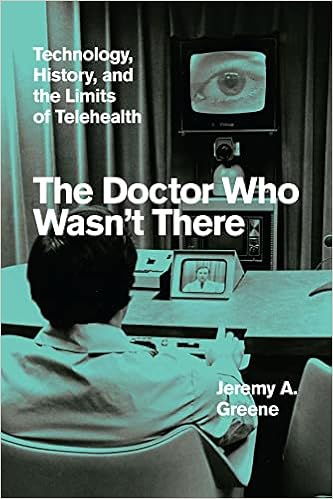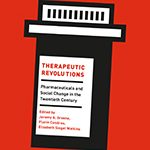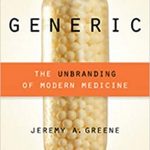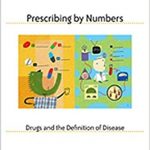
Jeremy A. Greene, MD, PhD
Institute of the History of Medicine
The Johns Hopkins University
1900 East Monument Street
Baltimore, MD 21205
Research Interests
History of modern medicine; history of technology; history of disease; history of therapeutics; media history; global health; medical anthropology
Bio
My research explores the ways in which medical technologies come to influence our understandings of what it means to be sick or healthy, normal or abnormal, on personal, regional, and global scales. In addition to directing the Institute of the History of Medicine, I am the founding Director of the Center for Medical Humanities and Social Medicine at Johns Hopkins University, Core Faculty in the Johns Hopkins Drug Access and Affordability Initiative, Associate Faculty at the Berman Institute of Bioethics, a co-Investigator in the Opioid Industry Documents Archive, the Black Beyond Data Project, and the Sawyer Seminar in Precision and Uncertainty in a World of Data, and hold joint appointments in the Department of History of Science and Technology and the Department of Anthropology at the Krieger School of Arts and Sciences.
My third and most recent book The Doctor Who Wasn’t There: Technology, History, and the Limits of Telehealth (University of Chicago Press, 2022) examines how changing expectations of instantaneous communications through electric, electronic, and digital media transformed the nature of medical practice and medical knowledge. This present work has been supported by a Faculty Scholars Fellowship from the Greenwall Foundation and a G13 Award from the National Library of Medicine. My first two books, Prescribing by Numbers: Drugs and the Definition of Disease and Generic: The Unbranding of Modern Medicine, (2007 and 2014, Johns Hopkins University Press) describe how the relationship of knowledge and practice, medical science and the pharmaceutical marketplace, and broader understandings of the relationship between medicine and public health can only be understood through understanding the complex histories of medical technologies (like pharmaceuticals) and the series of legislative, regulatory, clinical, and consumer decisions that guide their production, circulation, and consumption. My newest research project, Syringe Tide: Disposable Technologies and the Making of Medical Waste focuses on the scientific, social, and economic basis of the shift towards disposable technologies in hospitals and clinics that have made the health care industry one of the largest carbon-emitting and plastic waste-producing sectors of the global economy, and what might be done to correct this.
I received an MA in medical anthropology from Harvard in 2004, the MD and PhD degrees in the history of science from Harvard in 2005, completed a residency in Internal Medicine at the Brigham & Women’s Hospital in 2008, and am board certified in Internal Medicine and a member of the American College of Physicians. In addition to my appointment at the Institute for the History of Medicine, I also practice internal medicine at the East Baltimore Medical Center, a community health center affiliated with Johns Hopkins. My work has been recognized by the Roy Porter Award from the Society for Social History of Medicine, the J. Worth Estes Award and the Richard Shryock Medal from the American Association for the History of Medicine, the Edward Kremers Award from the American Institute for the History of Pharmacy, the Rachel Carson Prize from the Society for the Social Studies of Science, and most recently I was named the 2021 Nicholas Davies Award recipient from the American College of Physicians for “outstanding scholarly activities in history, literature, philosophy, and ethics and contributions to humanism in medicine.”
Publications
Selected Books
 |
Greene JA. The Doctor Who Wasn’t There: Technology, History, and the Limits of Telehealth. Chicago, University of Chicago Press, 2022. |
 |
Greene JA, Condreau F, and Watkins ES (eds.) Therapeutic Revolutions: Pharmaceuticals and Social Change in the 20th Century. Chicago: University of Chicago Press, 2016. |
 |
Greene JA. Generic: The Unbranding of Modern Medicine. Baltimore: Johns Hopkins University Press, 2014. |
 |
Greene JA and Watkins, ES. (eds.) Prescribed: Writing, Filling, Using, and Abusing Prescriptions in Modern America. Baltimore, 2012. |
 |
Greene JA. Prescribing by Numbers: Drugs and the Definition of Disease. Baltimore: Johns Hopkins University Press, 2007. |
Selected Articles
Alexander GC, Mix LA, Choudhury S, Taketa R, Tomori C, Mooghali M, Fan A, Mars S, Ciccarone D, Patton M, Apollonio DR, Schmidt L, Steinman MA, Greene JA, Ling PM, Seymour AK, Glants S, Tasker K. The Opioid Industry Documents Archive: A living digital repository. American Journal of Public Health. 2022; 112(8):1126-9.
Strodel R, Greene JA. Origins of the insulin crisis: How a half century of price-fixing controversies affects the cost of care today. The Lancet 2021; 398:10313.
Greene JA, Braitberg V, Bernadett GM. Innovation on the reservation: Information technology and health systems research among the Papago Tribe of Arizona, 1965-1980. Isis 2020; 111(3):443-470
Kveim Lie AH, Greene JA. From Ariadne’s thread to the labyrinth itself: Nosology and the infrastructure of modern medicine. N Engl J Med 2020; 382 (13), 1273-1277.
Greene JA, Lea AS. Digital futures past: The long arc of big data in medicine. N Engl J Med 2020; 381(5): 480-485
Bothwell, L, Greene JA, Podolsky SH, Jones DS. Assessing the gold standard: Lessons from the history of RCTs. N Engl J Med 2016:374:2175-81.
Greene JA. Do-it-yourself medical devices: Technology and empowerment in American health care. N Engl J Med 2016; 374: 305-9.
Jones DS, Greene JA, Duffin J, Harley Warner J. Making the case for history in medical education. Journal of the History of Medicine and Allied Sciences; 70(1):2015
Greene JA. Making medicines essential: the evolving role of pharmaceuticals in global health. BioSocieties 2011; 6:10-33.
Greene JA and Podolsky SH. Keeping modern in medicine: pharmaceutical promotion and physician education in postwar America. Bulletin of the History of Medicine 2009; 83: 331-377.
Selected Chapters
Greene JA, Mooney G, Sufrin C. The walking classroom: Teaching social medicine outside of the medical school. In Hansen H. (ed.) Structural Competency Case Book. New York: Springer Press, 2019, 15-25.
Greene JA. “Pharmaceutical Geographies: Mapping the Boundaries of the Therapeutic Revolution”. in Greene JA, Condrau F, and Watkins ES. Therapeutic Revolutions. Chicago, Univ Chicago Press, 2016.
Greene JA. “The Afterlife of the Prescription: Sciences of Therapeutic Surveillance” in Greene, Jeremy A. and Watkins, Elizabeth S. (eds.) Prescribed: Writing, Filling, Using, and Abusing Prescriptions in Modern America. Baltimore: Johns Hopkins University Press, 2012.
Greene JA. “Regulating Drugs, Regulating Disease: Diabetes, Consumerism, and the Tolbutamide Crisis, 1969-1984” in Jean-Paul Gaudilliere and Volker Hess (eds.), Making Drugs: Ways of Regulating in Factories, Laboratories, and Consulting Rooms. London: Palgrave Macmillan, 2011: 122-136.
Daemmrich A and Greene JA. “From Visible Harm to Relative Risk: Overcoming Fragmented Pharmacovigilance,” in Elhage, E. (ed.), The Fragmentation of U.S. Health Care: Causes and Solutions. Oxford, UK: Oxford University Press, 2010. 301-323.
Greene JA. “The Abnormal and the Pathological: Cholesterol, Statins, and the Threshold of Disease” in Andrea Tone and Elizabeth Watkins (eds.), Medicating Modern America: Pharmaceutical Drugs in History. New York: New York University Press, 2007; 183-228.
Selected Media
Jeremy Greene. “The Inflation Reduction Act Reflects the Changing Politics of Rx Drugs.” The Washington Post, August 17, 2022. https://www.washingtonpost.com/made-by-history/2022/08/17/inflation-reduction-act-reflects-changing-politics-rx-drugs/
Jeremy Greene, Dora Vargha, “How Epidemics End” The Boston Review June 30, 2020. http://bostonreview.net/science-nature/jeremy-greene-dora-vargha-how-epidemics-end
Gina Kolata “How Pandemics End” The New York Times May 10, 2020 https://www.nytimes.com/2020/05/10/health/coronavirus-plague-pandemic-history.html
Ana Maria Roura. “Jeremy Greene: “Es más probable que pensemos que la epidemia se acabó y dejemos de hablar de ella antes de que realmente acabe” BBC.com May 21, 2020. https://www.bbc.com/mundo/noticias-52732701
Jeremy Greene “After a Scandal, a One-Sided Warning Against Generic Drugs”. The Washington Post, September 13, 2019. https://www.washingtonpost.com/outlook/after-a-scandal-a-one-sided-warning-against-generic-drugs/2019/09/12/6a755e48-c50a-11e9-b5e4-54aa56d5b7ce_story.html
Jeremy Greene, “With Insulin Prices Soaring, Why Isn’t There a Generic Version?” WYPR: On the Record, May 19, 2019.
Jeremy Greene, Testimony for the Record, Submitted to the United States Senate Special Committee on Aging for Hearings on Insulin Access and Affordability: The Rising Cost of Treatment. May 8, 2018
WGBH: Innovation Hub: “The Power of Generic Drugs” 9 July 2015, http://blogs.wgbh.org/innovation-hub/2015/7/9/greene-generics/
WPR: Central Time, “Record $374 Billion Spent on Prescription Drugs in America Last Year” 14 April 2015; http://www.wpr.org/record-374-billion-spent-prescription-drugs-america-last-year
NPR: Morning Edition: “20 Years After Its Discovery, No Generic Insulin Sold in the U.S.” 22 March 2015, http://www.npr.org/2015/03/22/394634923/90-years-after-its-discovery-no-generic-insulin-sold-in-the-u-s
WNYC: The Leonard Lopate Show: “Similar How? The Cultural and Political Fights for Generic Drugs” 20 March 2015, http://www.wnyc.org/story/jeremy-greene-generic/
NPR: Shots: “Why is Insulin So Expensive in the U.S.?” 19 March, 2015, http://www.npr.org/sections/health-shots/2015/03/19/393856788/why-is-u-s-insulin-so-expensive
WPR: Central Time: “A Cultural History of Generic Drugs in America”, 30 September 2014, 31 December 2014, http://www.wpr.org/cultural-history-generic-drugs-america
WAMU: The Kojo Nmandi Show: “Generic: The Unbranding of Modern Medicine” 23 December 2014, http://thekojonnamdishow.org/shows/2014-12-23/generic_the_unbranding_of_modern_medicine
NPR: The People’s Pharmacy “The Pros and Cons of Generic Drugs” 13 December 2014, http://www.peoplespharmacy.com/2014/12/11/show-973-the-pros-and-cons-of-generic-drugs/
WYPR: Morning Edition with Sheilah Kast: “Generic: The Unbranding of Modern Medicine” 22 September 2014, http://wypr.org/post/generic-unbranding-modern-medicine
NPR: Science Friday: “The Science of Sameness: Developing Generic Medications” 12 September 2014, https://www.sciencefriday.com/segments/the-science-of-sameness-developing-generic-medications/
NPR: Marketplace: “The Future of the Pharmaceutical Sales Rep” 17 December 2013, https://www.marketplace.org/2013/12/17/future-pharmaceutical-sales-rep/
Teaching
AS 140.601.01: Research Methods in the History of Science, Medicine, and Technology
AS.140.668.01: Technology in Context
AS 170.024.01: Normal and Pathological
AS 145.105.01: Science, Medicine, and Media
AS 140.035.01: Ways of Knowing: New Histories of Science, Medicine & Technology
AS 140.106.01: History of Modern Medicine
SOM 150.714: Outline of History of Modern Medicine
SOM 150.734: Media Histories of Science, Medicine, and Technology
SOM 150.816: Biomedicine: History, Concepts, Practices
FPHE Selective: Introduction to Social Medicine I & II
Genes to Society: Lectures and Workshops in Health Disparities, Brain/Mind/Behavior, Pulmonary, Renal, GI/Liver, Musculoskeletal, and Reproductive Blocks